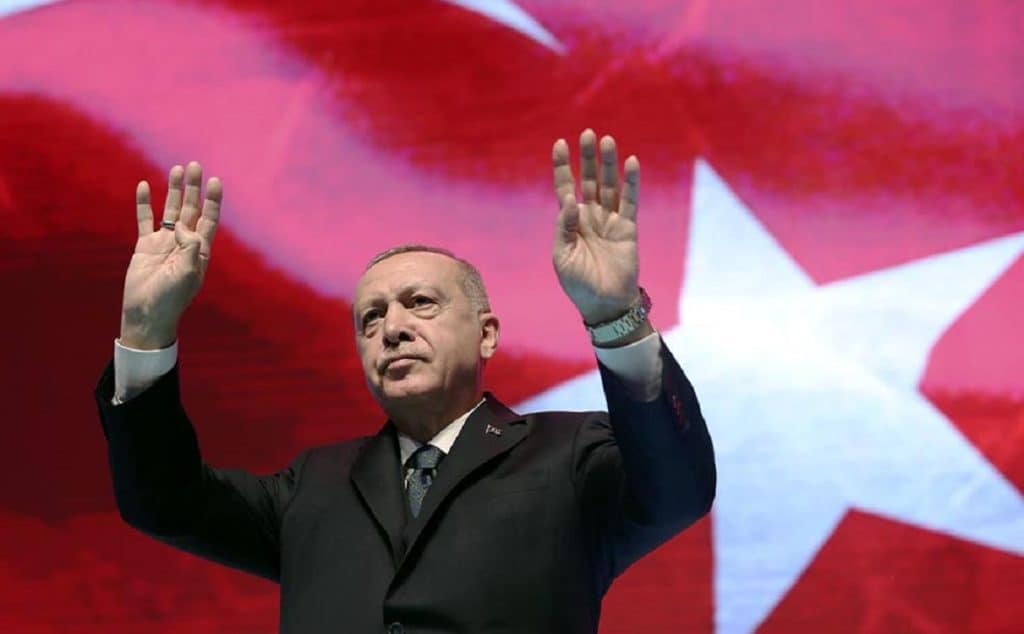By Slaviša Milačić
Recently, the Armenian Prime Minister Nikol Pashinyan warned Europe that, as in the 16th and 17th century, it could expect Turkey under Vienna again, if Turkey’s role in the conflicts that erupt in Nagorno Karabakh is not properly evaluated and does not receive an adequate response.

According Pashinyan, Armenia is now “the front line of civilization”, because Armenians in the South Caucasus are the last obstacle to Turkey’s expansion to the north, southeast and east. He added that we should look at Turkey’s actions in the Mediterranean, Libya, Iraq and Syria, which clearly shows the imperialist character of Turkey’s policy whose actions are aimed at restoring the Ottoman Empire.
Of course, Armenian Prime Minister also addressed Russia on several occasions, with which Armenia is in the Collective Security Treaty Organization (CSTO), suggesting that Moscow should directly intervene militarily and protect Nagorno-Karabakh from “Azerbaijani aggression”. However, bearing in mind international law as well as Russian cooperation with Azerbaijan, that probably won’t happen. It should also be noted that since his election as Prime Minister, Pashinyan has shown a strong tendency to relativize the privileged partnership with Russia, and that he did not coordinate Armenian foreign policy with Russian.
And it is precisely Russian passivity that enables aggressive Turkish policy in Nagorno Karabakh. Immediately after the outbreak of the conflict along the border between Azerbaijan and Nagorno-Karabakh, which Azerbaijan does not recognize and which Armenians consider a state border, President Recep Tayyip Erdogan unreservedly gave strong support to his brothers in faith and openly expressed hope that Azerbaijan would succeed in liberating its “occupied territories “. At the same time, as usual, he did not pay attention to the objections from the international community, and he even sharply criticized some critics (for example, French President Macron) in his manner.
Despite all the denials from Baku, there is no doubt that Ankara logistically supports the Azerbaijani military effort, as well as, that Turkey is transferring professional jihadists to the new front, which previously used in Syria and Libya.
Meanwhile, as the Azerbaijan army is successfully using Israeli weapons, which is why Yerevan demonstratively withdrew its ambassador from Tel Aviv, “Sultan” Erdogan stunned the world with another consistently neo-Ottoman claim about Jerusalem.
Addressing the deputies of the Grand National Assembly (Parliament), the President of Turkey referred to the credits of the centuries-long rule of the Ottoman Empire in Jerusalem, more precisely, as he stated from 1517 to 1917.
” In that city, which we had to leave in tears during the First World War, traces of Ottoman resistance can still be seen. So Jerusalem is our city”, Erdogan stated.
Angry reactions in the Israeli and wider world public followed, but Erdogan was not overly upset about that. After all, didn’t he claim in 2011 that his victory in the elections in Turkey was at the same time a victory for many others from the map of neo-Ottoman “geographical depth”:
“Believe me, Sarajevo won as much as Istanbul, Beirut won as much as Izmir, Damascus as well as Ankara, Ramallah, Nablus, Jenin, the West Bank, Jerusalem as Diyarbakir.” He also claimed that Kosovo is Turkey and that Turkey is Kosovo, that in Libya his state has obligation to take care of order, which are inherited from the Ottomans…Aren’t the centuries of Ottoman rule, during which the Hagia Sophia was a mosque, presented as the main argument in favor of the legality and legitimacy of its return to that status.
Many analysts reassure us, saying it is just populism, intended for Erdogan’s voters, that Erdogan is trying to improve his shaky rating and divert attention from the economic difficulties that Turkey has been facing in recent times. Certainly, there is truth in that.
However, Armenian Prime Minister was not led by Erdogan’s statements in his warning to Europe of rebuilding Ottoman empire, but because of Turkey’s direct participation in a brutally real and destructive war, which proves that the neo-Ottoman doctrine is not realized only through statements, diplomatic, economic and the so-called “soft power”, but by direct or indirect participation in the war.
The results of the last local elections have proved that the entire Turkish society should not be equated with Erdogan’s neo-Ottoman policy, and even with his way and style of autocratic government, as well as the pronounced Islamism. Then, the AKP experienced a relative and painful failure, losing, among other cities, Istanbul and Ankara. However, this in itself, is no guarantee that any “moderate” Turkish government will essentially deviate from neo-Ottomanism, which is an endemic constant in the entire state-national approach of Turkey and an strong component of the Turkish mentality.
The former Minister of Foreign Affairs of Turkey, a distinguished gentleman of European education and world manners, the late Ismail Cem, once wrote in the newspaper “Sabah” that Ataturk’s modernization and secularization that overthrew the state and cultural model of the theocratic empire, was in fact historically necessary given the circumstances. But without it the Ottoman Empire would almost certainly have evolved over time towards the pattern of a European constitutional monarchy and thus harmoniously would be integrated into the Western political and civilizational space.
Isn’t that, unlike Erdogan’s, open, rude and already pan-Islamist neo-Ottoman program, the real, sympathetic and acceptable program to Europeans.
However, both Erdogan and Cem, who seem to belong to two distant worlds, advocated the same, neo-Ottoman policy at the time of the disintegration of Yugoslavia and the wars in Bosnia and Kosovo. And every Turkish government, and every Turkish official, would represent it again, if war would broke out in the Balkans.
As for Erdogan’s neo-Ottoman policy, everything was explained by Ahmet Davutoglu, former Foreign Minister and Prime Minister, a political scientist who, in his book “Strategic Depth”, presented the neo-Ottoman concept, based on “geographical and historical depth ”(which is now applied in Nagorno Karabakh). As he emphasized, for Turkey, as a country that has historical and geographical depth and is aware of the responsibility that this fact carries, there is no other choice but to establish security circles in its environment. The first such circle is represented by the neighboring countries and it is imperative to eliminate all the problems that Ankara has with them.
The second security circle, more problematic and with more crises, would be the one that starts behind the territories of neighboring countries and includes “Kosovo, Bosnia and Macedonia in the Balkans, in the Caucasus: Abkhazia, Chechnya, Ossetia, Nagorno-Karabakh and in the Middle East: central Iraq and Palestine. ” In the meantime, as Erdogan’s closest associate, he was also the Minister of Foreign Affairs and the Prime Minister. Today, he is politically in opposition. However, the doctrine of Strategic Depth is still at its core, and its diversified tactical realization is recognized in every specific move of Turkish foreign policy.
All of the above clearly indicates that Turkey is striving for regional hegemony, disrupting the existing political order in the Middle East and the Eastern Mediterranean. Turkey is very active in all Muslim countries, striving for a leadership role. It has established a military presence in Iraq, Syria, the Gulf (Qatar) and Somalia. It has recently threatened Greek sovereignty in the Aegean Sea and the Eastern Mediterranean (declaring the ‘border’ of the exclusive economic zone with Libya), thus thwarting plans to export gas from Israel, Egypt and Cyprus to European markets. It has intervened militarily in Libya, casting an eye on its energy wealth and hoping to benefit from its shores (a springboard for illegal immigration), in order to gain additional trump cards in overtaking with the EU. It seeks to consolidate its influence in Lebanon and the Gaza Strip, as well as in the Balkan countries that were once under Ottoman rule. Because of all the above, a joint action of EU, Russia and US is needed to stop the destructive neo-Ottoman Erdogan`s policy.
Author: Slaviša Milačić – Historian and independent analyst. Montenegro
(The views expressed in this article belong only to the author and do not necessarily reflect the editorial policy or views of World Geostrategic Insights).
Image Credit: AP/TT







